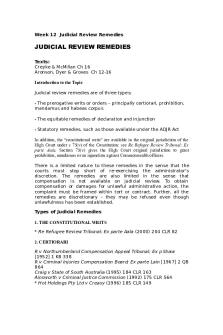Mercier lecture notes PDF

| Title | Mercier lecture notes |
|---|---|
| Course | The Invention of France |
| Institution | Durham University |
| Pages | 2 |
| File Size | 72.9 KB |
| File Type | |
| Total Downloads | 115 |
| Total Views | 154 |
Summary
Louis Sebastian Mercier's 'le tableau de paris'...
Description
Louis-Sébastien Mercier - Le Tableau de Paris Lecture 1 Read ‘The Open Work’ by Umberto Eco Olympe de Gouges: Declaration des droits de la femme et de la citoyenne Voltaire: Candide. Overview of 18th century ● Gradual decline of the french monarchy from Louis XIV onwards. ○ Dies, leaving few heirs, only his great-grandson (Louis XV) ○ Regent instead: Philippe d’Orléans, who brings back rule to Paris from Versailles. ○ Cardinal de Fleury in power as Prime Minister, France grows restless due to poor management. ○ Lots of overseas territories lost during the 7 years war 1756-1763 ○ France loses much power but remains the cultural hub of the period. ○ Marriage of Marie Antionette and Louis brings renewed hope for the monarchy.
The Enlightenment: le siècle des lumières ● Mercier seems sometimes to be an objective, emotionless writer, then at other times he is full of passion. ○ Takes it upon himself to describe Paris, his vision. Very subjective, overarching author who determines how we consider the city, however this is not the case as he invites the reader to critique and bring their own judgement on his work. ● Kant: ‘enlightenment is man’s emergence from his self-incurred immaturity’ (the ability to use one’s understanding without the guidance of another, having courage to use one’s own ideas). All have the capacity to be enlightened. ● Philosophes: ‘un homme qui agit en tout par raison’ - l'encyclopédie. ○ Can a woman write? Can someone write through madness? ○ Key figures: Fontenelle, Montesquieu, Emilie Du Châtelet. (she translated Newton’s work into french, Voltaire’s lover, praised scientist). D’Alembert, Condorcet, Sade.
● Jean Calas: protestant living in Toulouse, son found dead. Law court accused him of murdering him out of fear that he would convert to Catholicism. 1762, he was executed by breaking on the wheel. ○ Period of religious fanaticism, not just enlightenment. ○ Voltaire takes on the case and has Calas posthumously pardoned. ● Salonnières: women that would come together in salons to discuss intellectual ideas of the time. ● The way in which the ideas were circulated: not just new thought but new spirit. Public discussion, interest in the coffee house, theatre, newspapers: everyone has the right to speak their voice. Irrespective of social hierarchy or religion. NOt all ideals reached, but it was nonetheless a turning point in history, campaign to get rid of them. Mercier ● Born 1740 in Paris. Son of a swordsmith, comfortable but not wealthy background. ● Very influential in drama in the 18th century. Helped shift drama to a more moralistic and realistic style. ● Writing about himself: a reforming writer. Extra information ● Tableau de Paris published in 8 volumes. ● Use Gallica ● Lexilogos: lots of dictionaries, including 18th century ones....
Similar Free PDFs

Mercier lecture notes
- 2 Pages

Lecture notes, lecture 3
- 5 Pages

Lecture notes, lecture Subspaces
- 21 Pages

Lecture notes, lecture 14
- 3 Pages

Lecture notes, lecture 6
- 3 Pages

Lecture notes, lecture 7b
- 4 Pages

Lecture notes, lecture 13
- 12 Pages

Lecture notes, lecture 12
- 9 Pages

Lecture notes, lecture all
- 62 Pages

Lecture notes- Lecture 1
- 20 Pages
Popular Institutions
- Tinajero National High School - Annex
- Politeknik Caltex Riau
- Yokohama City University
- SGT University
- University of Al-Qadisiyah
- Divine Word College of Vigan
- Techniek College Rotterdam
- Universidade de Santiago
- Universiti Teknologi MARA Cawangan Johor Kampus Pasir Gudang
- Poltekkes Kemenkes Yogyakarta
- Baguio City National High School
- Colegio san marcos
- preparatoria uno
- Centro de Bachillerato Tecnológico Industrial y de Servicios No. 107
- Dalian Maritime University
- Quang Trung Secondary School
- Colegio Tecnológico en Informática
- Corporación Regional de Educación Superior
- Grupo CEDVA
- Dar Al Uloom University
- Centro de Estudios Preuniversitarios de la Universidad Nacional de Ingeniería
- 上智大学
- Aakash International School, Nuna Majara
- San Felipe Neri Catholic School
- Kang Chiao International School - New Taipei City
- Misamis Occidental National High School
- Institución Educativa Escuela Normal Juan Ladrilleros
- Kolehiyo ng Pantukan
- Batanes State College
- Instituto Continental
- Sekolah Menengah Kejuruan Kesehatan Kaltara (Tarakan)
- Colegio de La Inmaculada Concepcion - Cebu





